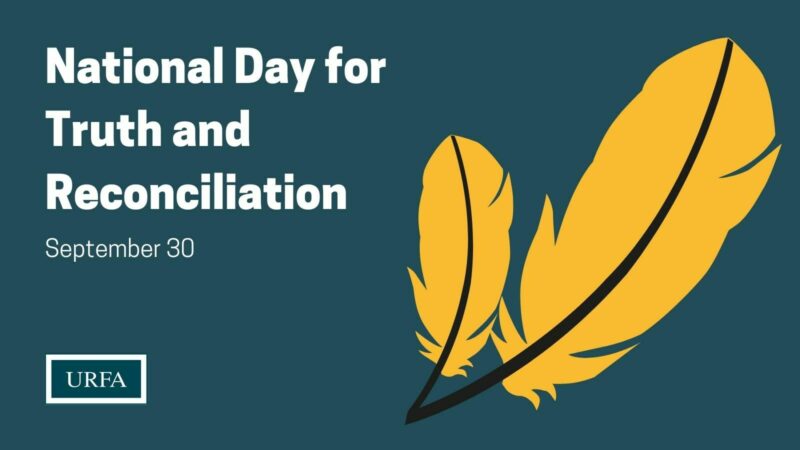URFA honours National Day for Truth and Reconciliation

September 30 is Canada’s first National Day for Truth and Reconciliation. This day is one way to honour residential school survivors, encourage learning about the atrocities of the residential school systems, and prompt reflection on how each of us can engage in reconciliation to create a better future.
There are no words to adequately describe the suffering and trauma that Indigenous children, their relatives and their communities experienced through Canada’s cultural genocide. While the residential school system no longer operates, the reality is that racism and discrimination are still exhibited towards Indigenous Peoples in multifaceted ways.
Our vision at URFA is that URFA members are diverse, engaged and secure in their employment and physical, mental, spiritual and emotional health. In an environment of academic freedom, freedom of expression, collegiality and respect, they drive a culture of teaching, research and community engagement that makes the world a better place. Our office is recognizing this day as a statutory holiday and we affirm the University of Regina’s decision to do so as well.
One of the ways we can bring our vision to life is to stand in solidarity with Indigenous Peoples. Words can be powerful and clear ways to demonstrate our support for Indigenous Peoples and when we find ways to demonstrate our support through action, we will see tangible, positive changes that will make the world better.
We’ve compiled a number of suggested action items for all of us to learn about, and reflect on, reconciliation and residential schools. Together, we can each contribute to reconciliation and build a society where Indigenous Peoples are valued, respected and honoured.
Discover
- Was there a residential school near where you live? Find out on this interactive map.
- Explore the Legacy of Hope Foundation website, which shares stories from residential school survivors.
- Discover the Vision of Reconciliation in Saskatchewan and identify one tangible way that you can take personal responsibility for reconciliation in your community and workplace.
- Look at the Office of the Treaty Commissioner in Saskatchewan’s reconciliation resources and sign-up for their e‑newsletter.
Offer financial support
- Make a donation to an Indigenous-led charitable organization, such as the Legacy of Hope Foundation.
- Refer to, and support, Indigenous businesses and services.
- Get to know and support Indigenous artists, creators, authors and producers.
Read
- Review the Truth and Reconciliation Commission of Canada’s Calls to Action, focusing on the Education section. Identify one tangible way that you can incorporate one or more of the calls into your work.
- Pick up and read the book Storying violence: Unravelling colonial narratives in the Stanley Trial by Gina Starblanket and Dallas Hunt.
- Read the article Indigenizing the academy / Five years after the Truth and Reconciliation Commission by the Canadian Association of University Teachers.
- Explore the highlighted reports on the National Centre for Truth and Reconciliation website.
- Read the article Truth before reconciliation: 8 ways to identify and confront residential school denialism by Daniel Heath Justice and Sean Carleton.
Show
- Wear orange as one way to visibly demonstrate your support for, and solidarity with, Indigenous Peoples.
Study
- Enroll in the Reconciliation Education course offered by First Nations University of Canada.
- Take the Indigenous Canada course offered by the University of Alberta, which explores key issues facing Indigenous Peoples from an Indigenous, historical and critical perspective highlighting national and local Indigenous-settler relations.
